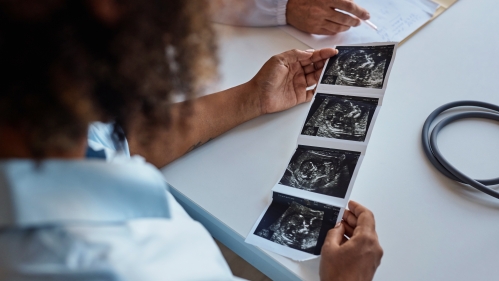
Divisions: Obstetrics, Gynecology and Reproductive Sciences
Message from the Division Chief

The Division of Complex Family Planning at Robert Wood Johnson Medical School provides comprehensive, compassionate, up-to-date reproductive health care for your simple or complex family planning needs.
Our subspecialist-trained family planning gynecologists offer a wide range of services in a comfortable, private, and sensitive environment with a dedicated support staff. We offer care and support for women coping with pregnancy loss, abnormal pregnancies, and unplanned pregnancies. All our patients receive individual attention from our expert physician team who will see you through the counseling, treatment, and follow-up processes.
Our team has years of experience and focused expertise in the management of women with underlying medical conditions and patients who have experienced contraceptive side effects. We will work closely with you to select the most appropriate family planning option and assist you in accessing necessary services. Our services are completely confidential, and your privacy, safety, and comfort are crucial.
Glenmarie Matthews, MD, MBA, MS
Associate Professor, Family Planning Specialist
Director, Ryan Residency Training Program
Division Chief, Complex Family Planning
Faculty

Lily Bayat, MD, MPH

Glenmarie Matthews, MD, MBA, MS
Advance Practice Providers:
Stephanie Brito, APN
Family Planning Services
We provide all birth control options, including IUDs (intrauterine devices), oral contraceptives (the pill), and hormonal implants, as well as permanent sterilization choices. Our contraceptive services include care for women of advanced reproductive age in their forties and those who have co-existing medical conditions and who may need to delay pregnancy.
For patients who qualify, financial assistance is available to cover a long-acting reversible contraception (LARC) method, such as the hormonal intrauterine device Mirena®, the nonhormonal intrauterine device ParaGard®, and the subdermal contraceptive implant Nexplanon®.
We provide supportive and comprehensive care for miscarriages, abnormal pregnancies, and unplanned pregnancies.
- Medical abortion and management of miscarriage through 10 weeks of gestation
- In-office surgical abortion and management of miscarriage through 10 weeks of gestation
- Surgical abortion and management of fetal death in the second trimester, through 24 weeks of gestation
For those requiring operating room services, hospital staff, and anesthesiology partner with us to provide quality care for high-risk and medically complicated patients.
We accept most commercial insurances, and our office staff is available to help you understand your financial responsibilities and assist you in securing insurance coverage.
Commitment to Education and Research
Division of Complex Family Planning offers comprehensive clinical services in a caring, supportive environment designed to meet the needs of our diverse population, while also training young physicians. Our division is home to a Kenneth J. Ryan Residency Training Program in Family Planning, which provides the foundation for resident and medical student family planning education in our department. Family planning research focuses locally and internationally on social, educational, and clinical interventions.
Contact Us
Clinical Academic Building (CAB)
125 Paterson Street, Suite 4200
New Brunswick, NJ 08901
For appointments: (732) 235-6600 or (732) 235-6975
Message from the Chief

Welcome to the Division of Epidemiology and Biostatistics. Established in 1996, this division is perhaps the only one of its kind within an OBGYN department. It offers tremendous research and teaching opportunities in perinatal, reproductive epidemiology, and biostatistics. The Division has a long history of conducting research in reproductive and perinatal epidemiology, as well as women’s health along the life course.
Cande Ananth, PhD, MPH
Distinguished Professor and Vice Chair for Academic Affairs
Chief, Epidemiology and Biostatistics
Faculty

Cande Ananth, PhD, MPH
Distinguished Professor and Vice Chair for Academic Affairs and Chief of the Division of Epidemiology and Biostatistics
Areas of Expertise Perinatal Epidemiology and Biostatistics

Emily Rosenfeld, DO
Selected Publications
Accordion Content
-
- Brandt JS, Ananth CV. Placental abruption at near-term and term gestations: pathophysiology, epidemiology, diagnosis, and management. American Journal of Obstetrics and Gynecology 2023 May;228(5S):S1313-S1329. PMID: 37164498; PMCID: PMC10176440.
- Fields JC, Graham HL, Brandt JS, Bodenlos K, Ananth CV. Risk of postpartum readmission for depression in relation to ischaemic placental disease: a population-based study. EClinicalMedicine (Lancet). 2023 May 25;60:102011. PMID: 37251629; PMCID: PMC10220321.
- Ananth CV, Brandt JS, Keyes KM, Graham HL, Kostis JB, Kostis WJ. Epidemiology and trends in stroke mortality in the USA, 1975-2019. International Journal of Epidemiology 2023 Jun 6;52(3):858-866. PMID: 36343092; PMCID: PMC10244057.
- Sachdev D, Yamada R, Lee R, Sauer MV, Ananth CV. Risk of Stroke Hospitalization After Infertility Treatment. JAMA Network Open 2023 Aug 1;6(8):e2331470. PMID: 37647063; PMCID: PMC10469284.
- Ananth CV, Rutherford C, Rosenfeld EB, Brandt JS, Graham H, Kostis WJ, Keyes KM. Epidemiologic trends and risk factors associated with the decline in mortality from coronary heart disease in the United States, 1990-2019. American Heart Journal 2023 Sep;263:46-55. PMID: 37178994.
-
- Suarez EA, Huybrechts KF, Straub L, Hernández-Díaz S, Creanga AA, Connery HS, Gray KJ, Vine SM, Jones HE, Bateman BT. Postpartum Opioid-Related Mortality in Patients With Public Insurance. Obstetrics & Gynecology. 2023 Apr 1;141(4):657-665.
- Suarez EA, Nguyen M, Zhang D, Zhao Y, Stojanovic D, Munoz M, Liedtka J, Anderson A, Liu W, Dashevsky I, DeLuccia S, Menzin T, Noble J, Maro JC. Monitoring Drug Safety in Pregnancy with Scan Statistics: A Comparison of Two Study Designs. Epidemiology. 2023 Jan 1;34(1):90-98.
- Suarez EA, Huybrechts KF, Straub L, Hernández-Díaz S, Jones HE, Connery HS, Davis JM, Gray KJ, Lester B, Terplan M, Mogun H, Bateman BT. Buprenorphine versus Methadone for Opioid Use Disorder in Pregnancy. N Engl J Med. 2022 Dec 1;387(22):2033-2044.
- Suarez EA, Bateman BT, Hernández-Díaz S, Straub L, Wisner KL, Gray KJ, Pennell PB, Lester B, McDougle CJ, Zhu Y, Mogun H, Huybrechts KF. Association of Antidepressant Use During Pregnancy With Risk of Neurodevelopmental Disorders in Children. JAMA Internal Medicine. 2022 Oct 3;182(11):1149-60.
Projects and Funding
Cande Ananth, PhD, MPH
- Cardiovascular Health after Placental Abruption (PI with Kostis WJ). Funded by the National Heart, Lung, and Blood Institute, National Institutes of Health (R01-HL150065) 2019-2024
- Ambient Air Pollution, Weather, and Placental Abruption (PI). Funded by the National Institute of Environmental Health Sciences, National Institutes of Health (R01-ES033190) 2021-2026
Contact Us
Clinical Academic Building
125 Paterson Street
New Brunswick, New Jersey 08901
Telephone: (732) 235-6632
Fax: (732) 235-7349
Message from the Chief

Welcome to the Division of General Obstetrics and Gynecology. Our physicians are dedicated to providing state-of-the-art preventive OB/GYN care for the optimal well-being of our patients. Our team approach involves not only our doctors and nurses, but also our patients.
Our group has special interests in:
- Female Pelvic Medicine and Reconstructive Surgery
- Adolescent health
- Perimenopause
- Menopause
- Chronic vaginal infections
Anthony Monteiro, DO
Assistant Professor
Director, Eric B. Chandler Health Center
Faculty

Ashraf Aly, MD

Charletta A. Ayers, MD, MPH
Associate Professor, Assistant Dean of Multicultural Affairs, and Vice Chair of Clinical Affairs, Department of Obstetrics, Gynecology, and Reproductive Sciences
Emailayersca@rutgers.edu

Gloria Bachmann, MD, MMS
Professor, Co-Director of the Women's Health Institute, Associate Dean for Women's Health, and Medical Director of the PROUD Gender Center of NJ
Areas of Expertise General Gynecology
Emailbachmaga@rutgers.edu

Lily Bayat, MD, MPH

Neha Bhagat, DO

Payal Chowdhary, MD

Gary Ebert, MD

Shalini Gupta, MD
Assistant Professor
Areas of Expertise Minimally Invasive Gynecologic surgeon, Menopausal Expert

Megan Kaminskyj, MD

Glenmarie Matthews, MD, MBA, MS

Lena Merjanian, MD

Anthony Monteiro, DO

Fred Nichols, DO

Jessica Opoku-Anane, MD, MS

Archana Pradhan, MD, MPH
Interim Chair, Dept of Obstetrics, Gynecology and Reproductive Sciences, Associate Dean for Clinical Education, and Professor
Emailpradhaar@rutgers.edu

Fred Silverberg, MD

Ezinnem C.N. Ugoji, MD

Christina Varela-Diaz, MD
Advanced Practice Providers:
Randa Francis, DNP, CNM, WHCNP-BC
Clinical Care Services
- State-of-the-art contraception options including ESSURE, a new hysteroscopic contraceptive device
- Obstetrical care of low and certain high-risk pregnancies,
- Routine gynecologic care
- Minimally invasive gynecologic surgery program including colposcopy, hysteroscopy, and laparoscopy
- Urogynecologic service
- Colposcopy for evaluation of cervical and vaginal dysplasia
- Preventive gynecologic care
- Prepregnancy counseling
- Obstetrical care for low and certain high-risk pregnancies
- Gynecological ultrasounds
- Sonohystograms
Contact Us
Clinical Academic Building
125 Paterson Street
New Brunswick, New Jersey 08901
For Appointments:
Telephone: (732) 235-6600
Fax: (732) 235-6650
Message from the Chief

The Division of Gynecologic Oncology provides continuity of care using different combinations of therapy, including surgery, chemotherapy, biological modifiers, radiation therapy, and the most promising experimental strategies available to women with gynecologic cancer. The team is attentive to a woman’s emotional, social, and family needs in addition to the woman’s health concerns.
James Aikins, MD
Associate Professor
Chief, Gynecologic Oncology
Director, Gynecologic Oncology Fellowship Program
Cancer Institute of New Jersey
Fellowship
Gynecologic Oncology Fellowship Program
The Gynecologic Oncology Fellowship Program is a 3-year program, with 1 year of dedicated research and 2 clinical years focusing on inpatient and outpatient management of patients with gynecologic malignancies.
Faculty

James Aikins, MD, FACOG, FACS

Eugenia Girda, MD, FACOG

Aliza Leiser, MD, FACOG

Sonali Patankar, MD, FACOG

Ruth Stephenson, DO, FACOG
Contact Us
The Cancer Institute of New Jersey
195 Little Albany Street
New Brunswick, New Jersey 08901
Telephone: (732) 235-6777
Message from the Chief

Welcome to the Division of Urogynecology and Reconstructive Pelvic Surgery
At Rutgers Health, our Division of Urogynecology and Reconstructive Pelvic Surgery provides comprehensive care for women with pelvic floor disorders. Led by our esteemed Chief, Dr. Juana Hutchinson-Colas, we specialize in diagnosing and treating conditions such as urinary incontinence, pelvic organ prolapse, and other complex pelvic floor dysfunctions.
We are proud to be part of a department that values excellence in clinical care, research, and education. Our faculty are actively involved in groundbreaking research projects and collaborate with leading institutions to advance the field of urogynecology. We are committed to training the next generation of healthcare providers and fostering an environment of continuous learning and improvement.
Our Expertise
Our highly skilled surgeons and healthcare professionals are committed to delivering personalized and compassionate care. We utilize the latest advancements in medical technology and surgical techniques to ensure the best possible outcomes for our patients. Our services include:
- Advanced Diagnostic Evaluations: Utilizing state-of-the-art imaging and diagnostic tools to assess pelvic floor conditions accurately.
- Minimally Invasive Surgery: Offering vaginal and robotic-assisted procedures to reduce recovery time, postoperative pain and improve surgical precision and outcome.
- Comprehensive Patient Education: Empowering patients with knowledge and resources to manage their conditions effectively.
- Pelvic Floor Rehabilitation: We closely collaborate with expert physical therapists who provide specialized physical therapy and rehabilitation programs to strengthen and restore pelvic floor function.
Our Commitment
We understand the impact that pelvic floor disorders can have on a woman's quality of life. Our division is dedicated to improving the health and well-being of our patients through innovative treatments, compassionate care, and ongoing support. We strive to create a welcoming and supportive environment where every patient feels heard, respected, and cared for.
Connect with Our Team
If you or a loved one is experiencing symptoms of a pelvic floor disorder, we encourage you to reach out to our division for a consultation. Together, we can develop a personalized treatment plan to help you regain control and improve your quality of life.
Juana Hutchinson-Colas, MD, MBA
Professor of Obstetrics, Gynecology, and Reproductive Sciences
Chief, Urogynecology and Reconstructive Pelvic Surgery
Co-Director, The Pelvic Floor Program
Faculty

Juana Hutchinson-Colas, MD, MBA

Shirly Solouki, MD
Assistant Professor
Areas of Expertise Urogynecology and Reconstructive Pelvic Surgery
Emailss3709@rutgers.edu
Advance Practice Providers:
Linet Llaurado, DNP, WHNP-CNM
Contact Us
125 Paterson Street
New Brunswick, New Jersey 08901
For Appointments
Telephone: (732) 235-6600
Fax: (732) 235-6690
Pelvic Floor Program: (732) 235-6600
Fax: (732) 235-6690
Overview
At the Division of Maternal-Fetal Medicine, we are dedicated to providing expert, compassionate care for individuals with high-risk pregnancies while advancing the science and education of maternal and fetal health. As part of an academic medical center, we integrate cutting-edge research, world-class clinical care, and rigorous training to improve outcomes for parents and babies—today and for generations to come.
Our Mission
To deliver exceptional care for complex pregnancies, lead groundbreaking research that informs clinical practice, and train the next generation of leaders in maternal-fetal medicine.
Fellowship
Maternal-Fetal Medicine Fellowship
The fellowship in Maternal-Fetal Medicine is a three-year fellowship designed to provide comprehensive exposure to all areas of our discipline.
Faculty

Elena Ashkinadze, MS, CGC

Julia Knypinski, MD

William Macmillan, MD

Emily Rosenfeld, DO


Ruchira Sharma, MD
Clinical Care Services
Accordion Content
-
- High-risk Pregnancy Evaluation and Consultation Service
- 24-hour High Risk Pregnancy Coverage
- Critical Care Obstetrics
- Center for Fetal Diagnosis and Therapy with high-level fetal ultrasound including 3D/4D technology
- First trimester genetic/aneuploidy screening (ultrasound and blood test)
- Second-trimester Genetic Sonogram Service
- Amniocentesis, chorionic villus sampling, fetal blood sampling
- Fetal Cardiovascular Evaluation Service/Echocardiography
- Pregnancy Loss Evaluation Service
- Preterm Birth Evaluation and Prevention Service
- Center for Clinical Outcomes and Continuous Quality Improvement
- Genetic Counseling Service
Section of Perinatal Genetics
The Section of Perinatal Genetics is a comprehensive clinical service that evaluates, diagnoses, manages, and treats defects before birth. These may involve chromosomal abnormalities, hereditary disorders, and metabolic conditions before and during pregnancy, as well as structural anatomical defects during pregnancy. The Section of Perinatal Genetics is part of the Division of Maternal-Fetal Medicine in the Department of Obstetrics, Gynecology, and Reproductive Sciences.
The Section is professionally staffed with Master-level trained and board-certified (or board-eligible) genetic counselors. As a part of the Division of Maternal-Fetal Medicine, close collaboration exists with high-risk obstetricians and antepartum testing to ensure coordinated care. Collaborative efforts among geneticists, maternal-fetal medicine, neonatology, and pediatric specialists as well as primary care providers improve pregnancy management and neonatal outcomes by permitting earlier diagnosis and therapeutic intervention for many fetal defects and genetic disorders.
Genetic counseling is a process of educating patients about risks to their pregnancy due to age, screening results, ultrasound findings, family history, and other concerns. In addition to defining risks, genetic counselors will explain the diagnostic testing and screening options available to ensure the best pregnancy outcome.
A typical genetic counseling appointment lasts 30-60 minutes. Many patients will bring their partner or another support person to the session. The genetic counselor will draw and analyze the family tree and ask questions regarding the patient’s and partner’s family history.
The medical and pregnancy history of each member of the couple will be reviewed, including the outcomes of all previous pregnancies and exposures or medications during the current pregnancy. The genetic counselor will review prenatal test results, including blood work, ultrasound examinations, and diagnostic test results, and explain in detail if any concerns were identified. They will analyze this information to help assess the risk of having a child with a birth defect, intellectual disability, genetic disease, or a chromosome abnormality.
All the available prenatal screening and diagnostic testing options will be reviewed in detail using diagrams and other visual aids, and questions are encouraged. They will help coordinate additional recommended testing with the appropriate laboratories and physicians. A letter will be sent to the referring physician summarizing the genetic counseling session and any care recommendations.
Most patients who undergo genetic counseling are reassured about their baby’s health.
Communication regarding genetic counseling services is available in English, Russian, Mandarin, Gujarati, and Hindi. For all other languages, interpreter services are available.
Indications for Referral
Common reasons for referral during pregnancy include:
-
As women get older, they have an increased risk for a pregnancy with a chromosome problem. Typically, women 35 and older seek genetic counseling to learn about the different blood tests, ultrasounds, and diagnostic testing such as chorionic villus sampling and amniocentesis. Genetic counselors can help women, of any age, determine a plan for testing that is right for them.
-
The father’s age is important as well. As men age, they have an increased risk for a child with certain birth defects, chromosome problems, genetic conditions, and autism. Genetic counselors can educate individuals about these risks and determine a plan for testing during the pregnancy.
-
Regardless of the age of the parents, all women have a range of testing options available during their pregnancy to check for fetal chromosome problems. These include first-trimester screening, cell-free DNA (NIPS), level II anatomy ultrasound, chorionic villus sampling, and amniocentesis.
Genetic counseling can help clarify a testing strategy for patients that aligns with their desired outcomes, whether considered high risk because of maternal age, or just interested in prenatal testing.
-
Patients who have an abnormal first-trimester screen, increased nuchal translucency, abnormal NIPS result, or abnormal ultrasound finding can be referred for an explanation of the finding(s) and discussion regarding further fetal evaluation.
Patients who have an abnormal CVS or amniocentesis result may also be referred for a detailed discussion regarding the clinical features of the condition and to review their options for pregnancy management.
-
Couples who have had a child affected by a genetic condition, intellectual disability, autism, or birth defect and are concerned regarding the risk of recurrence for future children would benefit from genetic counseling.
-
Couples related by blood, such as first or second cousins, can be referred for family history evaluation and discussion regarding the risks to their unborn child.
Blood tests for the couple can be arranged to determine their risk and additional testing during pregnancy and after birth may be arranged.
-
Patients who are concerned regarding medication, x-ray exposure, alcohol, illicit drug exposure, or occupational exposure can be referred to assess the potential risk to the developing fetus.
-
Individuals who have a personal history or family history of birth defects or genetic conditions seek genetic counseling to understand if the condition can affect their unborn child.
Often blood tests can be arranged to determine if a future child is at risk and a plan can be made for reducing the risk of having an affected child.
Specialized Services
We offer several specialized services in addition to our common indications for referral, including:
-
Patients who have a history of recurrent miscarriage, infertility, or stillbirth can be referred for assessment to determine if a genetic or chromosomal cause is contributing to their adverse reproductive history.
-
For couples who are planning a pregnancy, genetic counseling is important to review their family history and arrange blood work to determine if they may be at risk for a child with a genetic disorder. Identifying at-risk couples before pregnancy is crucial because they would have the option of in vitro fertilization and transferring embryos that are free of that disease.
-
In the age of direct-to-consumer testing such as 23andMe, we can work with patients to help them understand their results and arrange confirmatory testing through a medical lab, when confirmation is necessary for medical management.
-
When a patient has a family history of cancer, genetic counseling is available to help understand their risk and the option of genetic testing for genes associated with familial cancers.
-
If you are concerned or need confirmation during pregnancy about the paternity of your fetus, we are available to arrange testing (blood test or diagnostic testing such as CVS or amniocentesis) to confirm the paternity of your fetus. An appointment with our genetic counselors can help you understand your options, cost, and timing of the testing.
Contact Us
Contact the Division of Maternal-Fetal Medicine
Robert Wood Johnson University Hospital
One Robert Wood Johnson Place
New Brunswick, NJ 08901
Telephone: (732) 235-8006
Fax: (732) 235-6650
Appointments: (732) 235-8006
Contact the Section of Perinatal Genetics
Robert Wood Johnson University Hospital
One Robert Wood Johnson Place
New Brunswick, New Jersey 08901
For Appointments:
Office line: (732) 235-6630
Fax: (732) 235-5230
Appointments: (732) 235-6600
Our Office Location:
125 Paterson Street
New Brunswick, NJ
Message from the Chief

The Department of Obstetrics, Gynecology, and Reproductive Sciences provides high-quality comprehensive reproductive health care, teaching, and research through its affiliation with the world's largest provider of fertility services, IVI-RMA. Subspecialty providers in reproductive endocrinology and infertility are academically and clinically focused, and they are trained to diagnose and manage the most complicated disorders that affect women’s reproductive health. Physicians at Reproductive Medicine Associates of New Jersey (RMA of NJ) are members of the RWJMS volunteer faculty and hold clinical academic titles. Our medical students and Ob/Gyn residents rotate through various clinical sites throughout the state. RMA of NJ has served as the Reproductive Endocrinology & Infertility Division for Robert Wood Johnson Medical School since 2006.
IVI-RMA is a recognized global leader in reproductive medicine and the largest among the most experienced, and successful centers for infertility treatment. Treatment centers are located throughout the world. You can learn more about RMA of NJ on their website (https://rmanetwork.com).
You may also speak directly with an RMA of NJ patient coordinator by calling 866-762-3140. They can provide information about the physicians and clinical programs at RMA of NJ, answer any questions about insurance, and, if appropriate, will be able to schedule an appointment for your patients.
Mark V. Sauer, MD, MS
Professor
Senior Associate Dean for Women’s Health, Rutgers Robert Wood Johnson Medical School
Contact Us
For appointments call: 973-656-2089
